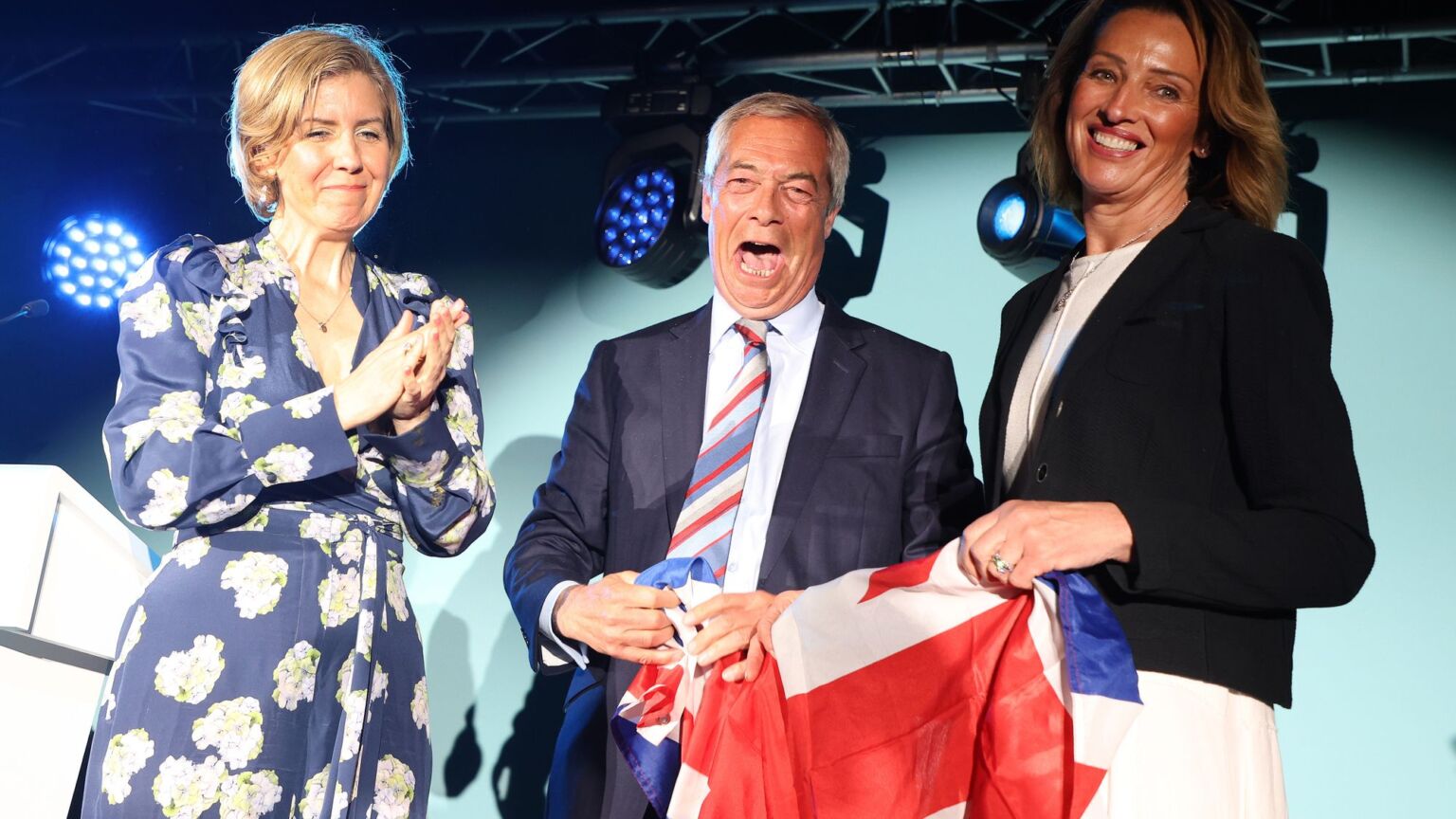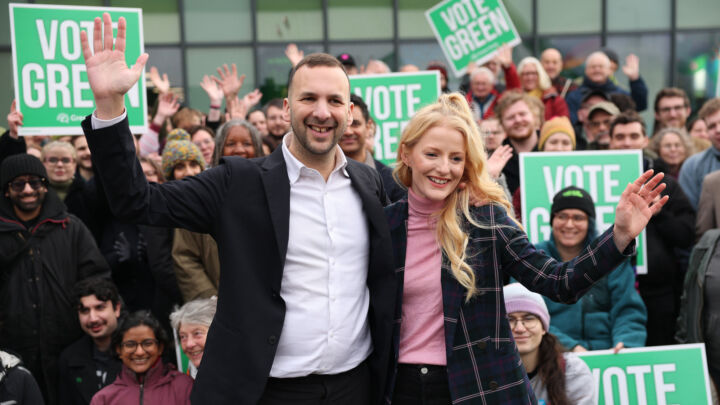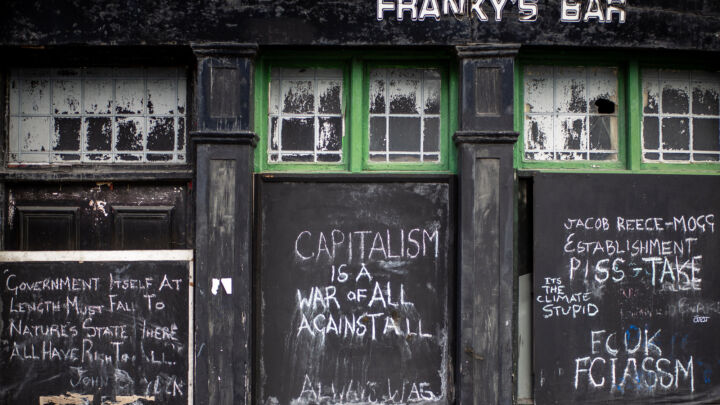Even in ‘boring’ British politics, anything can happen now
Reform’s triumph in these elections confirms that in the UK, as across Europe, the old political order is finished.

Want unlimited, ad-free access? Become a spiked supporter.
The remarkable success of Nigel Farage’s Reform UK in the English local elections confirms, as noted by spiked editor Tom Slater, that the spirit of the Brexit revolt is still alive and kicking. The collapse of support for both Labour and the Conservatives also showed that, in one sense, British politics is becoming closer to Europe’s. And that’s more bad news for the (ironically pro-EU) establishment parties.
Across the continent in recent decades, the ‘mainstream’ parties have suffered dramatic declines or even disappeared altogether – especially since the populist insurrection started turning European politics on its head.
Italy’s long-dominant Christian Democrats went into the same dustbin of history as the rival Communist Party. In Germany, the Christian Democrats / Social Democrats duopoly that almost monopolised postwar politics is now clinging together for dear life, the parties barely able to muster a majority of votes between them. Only in Britain, we were assured, did the old two-party order continue to hold sway. But that superficial stability was an illusion.
The Brexit referendum result in 2016, followed by the victory of Nigel Farage’s Brexit Party in the 2019 European elections and the emergence of Reform in last year’s UK General Election, showed that things were changing here, too. The victory of Farage’s insurrectionary movement in this week’s parliamentary by-election, local and mayoral elections has confirmed that the old order is coming to an end and there is no going back.
We now know that, even in ‘boring’ old British politics, anything can happen. The populist revolt is great for those of us who want to see political change. But it is a dire prospect for the Labour and Tory parties who built, and rely on, the staid status quo.
The closer you look at the results, the worse it gets for the UK political establishment. For example, Kemi Badenoch’s Conservatives lost 15 of the local councils that they had controlled before the elections. Impossible as it might seem, things have got even worse for the Tories since their General Election drubbing last July.
For its part, Keir Starmer’s Labour, which won a ‘landslide’ only last summer, achieved about the same level of support as the Greens last week. The combined Tory-Labour results amounted to about one-third of the votes cast – an historic low.
Worse, as top poll-watcher Sir John Curtice has noted, support for both the Conservatives and Labour is falling more heavily in places where they previously were strongest. There are no more red or blue ‘walls’, no more heartlands, no safe seats or core votes that the old parties can rely on. The only reason things were not even worse for Labour and the Tories this week was that they colluded to ‘postpone’ local elections in several counties where Reform would have won big.
Although the Tories are reportedly facing ‘extinction’, Labour’s precipitate collapse seems even more striking. After all, it is barely 10 months since Starmer won one of the largest-ever parliamentary majorities – albeit by winning just one-third of the votes cast – and smug pundits were talking about ‘a decade of Labour rule’. Less than a year later, Labour already looks finished.
The contrast with the last time these local councils were elected, in May 2021, is revealing. Back then, Tory prime minister Boris ‘get Brexit done’ Johnson was still enjoying the fruits of his dramatic General Election victory in December 2019. Labour was hammered so badly in those 2021 local elections, and even lost the parliamentary stronghold of Hartlepool to the Tories in a by-election, that Starmer considered resigning as leader. Yet in this week’s local elections Labour did even worse than that, and lost one of its safest parliamentary seats, Runcorn and Helsby, to Reform.
As a consequence, after an even shorter time in office than Johnson had enjoyed in 2021, Starmer looks like a dead prime minister walking, his directionless party almost certain to lose any important election it contests. The extraordinary is becoming normal.
As for Reform, despite the desperate efforts of the media to ignore and belittle its history-making success (the top news on the BBC after polling day was that Prince Harry is a bit upset), nobody can now seriously dismiss Farage’s soaring movement as a mere ‘protest party’. Reform has growing support in every region, among former voters for all parties and none, and especially among the working classes.
The establishment’s horrified reaction to Reform’s latest breakthrough showed how much they fear and loathe Farage’s ‘upstart’ party – and particularly, Reform’s ‘revolting’ voters. The Faragophobic BBC could not hide its snobbish contempt when describing Reform’s newly elected regional mayor, former Tory minister Andrea Jenkyns, as a ‘former Greggs worker and Miss UK finalist’. Sneer all they like, but the BBC’s preferred ‘respectable’ parties will not be winning any UK popularity contests anytime soon.
When I spent the last day of the 2024 election campaign knocking on doors in Farage’s Clacton constituency, ordinary Tory voters were visibly angry over the betrayal of Brexit and the disaster of uncontrolled mass migration. He won in a landslide. Now Labour is in the firing line.
‘There has never been an insurrection like this’, Nigel Farage told me when I interviewed him in January, and his words rang even truer this week. Boring British politics is exploding into a life and death struggle for the future. There is no telling how things will work out over the next three or four years before a General Election. But we should know by now, as they used to say at the start of the old TV show, Stingray: ‘Anything could happen in the next half hour.’
Mick Hume is the editor-in-chief of europeanconservative.com and a visiting fellow at MCC. He worked in communications for Reform UK during the 2024 General Election campaign.
You’ve hit your monthly free article limit.
Support spiked and get unlimited access.
Support spiked and get unlimited access
spiked is funded by readers like you. Only 0.1% of regular readers currently support us. If just 1% did, we could grow our team and step up the fight for free speech and democracy.
Become a spiked supporter and enjoy unlimited, ad-free access, bonus content and exclusive events – while helping to keep independent journalism alive.
Monthly support makes the biggest difference. Thank you.











Comments
Want to join the conversation?
Only spiked supporters and patrons, who donate regularly to us, can comment on our articles.